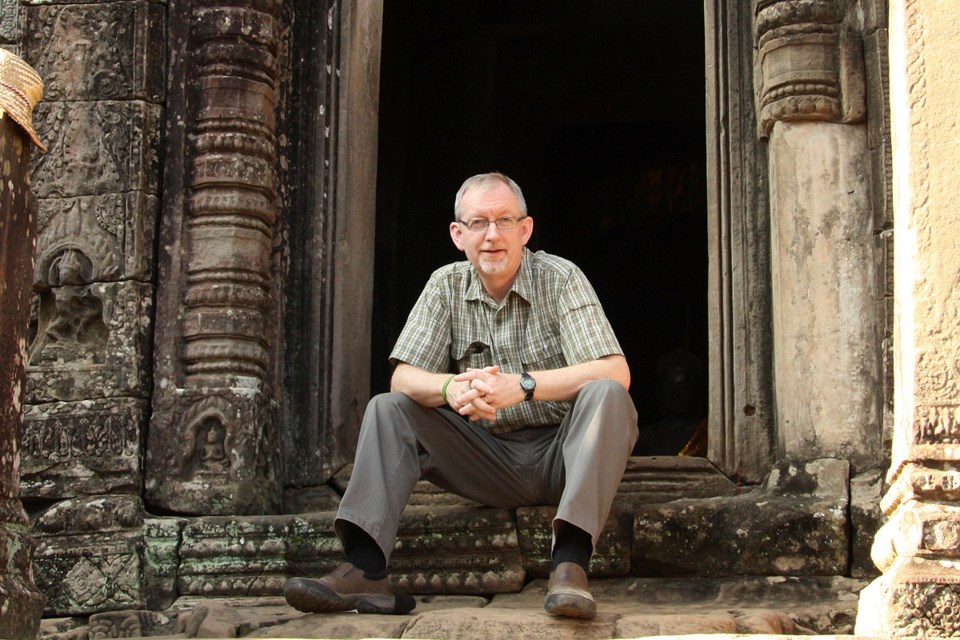As a forensic weapons expert for the RCMP, Brian McConaghy had seen a lot of human brutality. But nothing compared to the videos he watched of children being sexually assaulted by a Canadian “sex tourist.”
Because Vancouver police knew of McConaghy’s charitable work in Southeast Asia that they contacted him to help with a case. McConaghy founded Ratanak International, a Christian charity helping Cambodian orphans and other victims of the dystopic Khmer Rouge regime and its aftermath.
Doing double duty running an international charity while continuing his RCMP career, McConaghy, at the time, was doing forensic work on the remains of women Robert Pickton had murdered. That investigation opened McConaghy’s eyes to the abuse suffered by prostituted women.
“I had never really encountered the world of prostitution and prostituted young girls and women,” he says. “It was a completely heartbreaking case to actually start to investigate and encounter these lives.”
But the VPD needed help with something halfway around the world. They wanted to know if McConaghy could sleuth out what country some videos had been filmed in.
“So, for the first time in my life I agreed to watch child sex assault videos,” he says. “Nothing prepared me for watching seven, eight, nine-year-old children being assaulted by a Canadian psychopath.”
He was pretty sure the children were speaking Khmer, the language of Cambodia. The architecture also pointed to Cambodia, he told his Vancouver police colleagues. Even narrowing it down to a country still meant that the chances of ever finding the kids in the video was pretty much nil, he admits.
Yet within 72 hours, McConaghy had the GPS location of the crime scene and the probable names of the children. It was another incredible turn that McConaghy credits to divine intervention.
Shaken by what he had witnessed on the videos, McConaghy had gone home and turned on the TV. Flipping the channels, he landed on NBC’s Dateline, something he didn’t routinely watch. There on American network TV was different footage from the exact location of the assaults he had just watched with the Vancouver police. The same “rape cubicles,” the same clearly Cambodian architecture.
He remembered back eight months when an American documentary filmmaker had approached him, saying they were about to rescue child victims of repeated pedophile rape and asking if the Ratanak orphanages could accommodate the kids.
“I said, no, I can't, not with the background of these kids, because they're going to be so damaged,” he recalled telling the American. “A normal orphanage is not going to be able to cope psychologically with what they bring to the table. It really frustrated me and I promised myself that one day I would be in a position to say yes, I'll take them, but we are going to have to have a special centre.”
McConaghy connected the VPD to the producer, who provided the location where the filming took place. Five of the seven girls he had seen on the videos were soon rescued. Four years later, McConaghy discovered that they were in a foster care program funded by his own charity.
The videos helped lead to the 2005 conviction of Donald Bakker, a B.C. man who was the first convicted under Canada’s 1997 “sex tourism” law.
Cambodia, McConaghy says, was particularly ripe for the horrors of child sex abuse by Western men. Where many countries have a problem with exploited children as young as 12, the unique vacuum the Khmer Rouge left in Cambodian society allowed organized crime and obliterated social structures to develop a sex industry involving some as young as toddlers.
Canadian police are among those from around the world now working with a tribunal into the crimes of the Khmer Rouge, including the sexual abuse that took place. The evidence is staggering.
Girls and young women were assigned to marry Khmer Rouge soldiers in mass weddings, then sent to immediately produce babies for the revolution, McConaghy says. Teenagers were placed under the bamboo floors of the raised houses to ensure that the newlyweds were doing their duty — and if sex wasn’t taking place, they could be shot.
“It really was an institutionalized, systematic policy of rape,” he says. “Basically every honeymoon in that period was a rape.”
Now, women are being asked by people associated with tribunals to open up about their experiences.
“And the perpetrators are not infrequently their current husbands,” says McConaghy. “Where do you start trying to fix this?”
For McConaghy’s part, he has expanded Ratanak to work with victims of sexual violence and exploitation.
He sees in everything he has accomplished the hands of God. What motivates him in this often emotionally disturbing work is his belief, founded in his Christianity, that every life has value.
“I firmly believe that you can't do it long-term, decade-in, decade-out, without a sense of justice and a sense that there is something, or someone, out there much bigger than we are and that there is ultimately justice — and that's my belief,” he says. The girls and women his charity helps, he says, “have value and they have meaning and they are profoundly precious. If you don't have a God that assigns that value to them, then we are just biological organisms and who cares what you do to them?”



